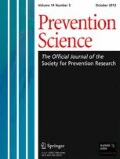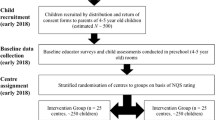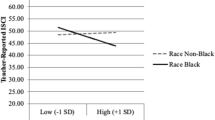Abstract
The transition to school may be particularly difficult for children with developmental disabilities and behavioral difficulties. Such children are likely to experience problems with self-regulation skills, which are critical to school adjustment. Additionally, inconsistent discipline practices and low parental involvement in children’s schooling may contribute to a poor transition to school. This study employed a randomized clinical trial to examine the effects of a school readiness intervention that focused on children’s self-regulation skills as well as parenting and parental involvement in school. Results showed that the intervention had positive effects on children’s self-regulation in kindergarten as measured by teacher and observer reports. Additionally, the intervention significantly reduced ineffective parenting prior to school entry, which in turn affected parental involvement. This finding is significant because it demonstrates that parental involvement in school may be increased by efforts to improve parenting skills in general. Overall, the study demonstrated that school adjustment across kindergarten among children with developmental disabilities and behavioral difficulties can be enhanced through an intervention aimed specifically at improving school readiness skills.

Similar content being viewed by others
References
Achenbach, T. M. (1991). Manual for the Child Behavior Checklist/4-18 and 1991 Profile. Burlington: University of Vermont.
Alexander, K. L., Entwisle, D. R., & Olson, L. S. (2001). Schools, achievement, and inequality: A seasonal perspective. Educational Evaluation and Policy Analysis, 23, 171–191. doi:10.3102/01623737023002171.
Arnold, D. S., O’Leary, S. G., Wolff, L. S., & Acker, M. M. (1993). The Parenting Scale: A measure of dysfunctional parenting in discipline situations. Psychological Assessment, 5, 137–144. doi:10.1037/1040-3590.5.2.137.
August, G. J., Lee, S. S., Bloomquist, M. L., Realmuto, G. M., & Hektner, J. M. (2003). Dissemination of an evidence-based prevention innovation for aggressive children living in culturally diverse, urban neighborhoods: The Early Risers effectiveness study. Prevention Science, 4, 271–286.
Baker, B. L., McIntyre, L. L., Blacher, J., Crnic, K., Edelbrock, C., & Low, C. (2003). Pre-school children with and without developmental delay: Behaviour problems and parenting stress over time. Journal of Intellectual Disability Research, 47, 217–230. doi:10.1046/j.1365-2788.2003.00484.x.
Baker, J. K., Fenning, R. M., Crnic, K. A., Baker, B. L., & Blacher, J. (2007). Prediction of social skills in 6-year-old children with and without developmental delays: Contributions of early regulation and maternal scaffolding. American Journal of Mental Retardation, 112, 375–391. doi:10.1352/0895-8017(2007)112[0375:POSSIY]2.0.CO;2.
Begle, A. M., Lopez, C., Cappa, K., Dumas, J. E., & de Arellano, M. A. (2012). Ethnicity differences in child and parental outcomes following involvement the PACE program. Behaviour Research and Therapy, 50, 56–65. doi:10.1016/j.brat.2011.09.009.
Benson, P., Karlof, K. L., & Siperstein, G. N. (2008). Maternal involvement in the education of young children with autism spectrum disorders. Autism, 12, 47–63. doi:10.1177/1362361307085269.
Blair, C., & Diamond, A. (2008). Biological processes in prevention and intervention: The promotion of self-regulation as a means of preventing school failure. Development and Psychopathology, 20, 899–911. doi:10.1017/S0954579408000436.
Blondal, K. S., & Adalbjarnardottir, S. (2009). Parenting practices and school dropout: A longitudinal study. Adolescence, 44, 729–749.
Brotman, L. M., Calzada, E., Huang, K.-Y., Kingston, S., Dawson-McClure, S., Kamboukos, D., et al. (2011). Promoting effective parenting practices and preventing child behavior problems in school among ethnically diverse families from underserved, urban communities. Child Development, 82, 258–276. doi:10.1111/j.1467-8624.2010.01554.x.
Cohen, J. (1988). Statistical power analysis for the behavioral sciences. Hillsdale: Erlbaum.
Conduct Problems Prevention Research Group (CPPRG). (1990). Social Competence Scale: Teacher version. Available from the Fast Track Project Web site, http://www.fasttrackproject.org
Cooper, H., Charlton, K., Valentine, J. C., & Muhlenbruck, L. (2000). Making the most of summer school: A meta-analytic and narrative review. Monographs of the Society for Research in Child Development, 65, 1–118.
Corrigan, A. (2002). Parent-Teacher Involvement Questionnaire: Parent version (Fast Track Project Technical Report): Available from the Fast Track Project Web site, http://www.fasttrackproject.org
Durston, S., Thomas, K. M., Yang, Y., Ulug, A. M., Zimmerman, R. D., & Casey, B. J. (2002). A neural basis for the development of inhibitory control. Developmental Science, 5, F9–F16. doi:10.1111/1467-7687.00235.
Eyberg, S. M., Nelson, M. M., & Boggs, S. R. (2008). Evidence-based psychosocial treatments for children and adolescents with disruptive behavior. Journal of Clinical Child and Adolescent Psychology, 37, 215–237. doi:10.1080/15374410701820117.
Feingold, A. (2009). Effect sizes for growth-modeling analysis for controlled clinical trials in the same metric as for classical analysis. Psychological Methods, 14, 43–45. doi:10.1037/a0014699.
Fenning, R. M., Baker, J. K., Baker, B. L., & Crnic, K. A. (2007). Parenting children with borderline intellectual functioning: A unique risk population. American Journal on Mental Retardation, 112, 107–121. doi:10.1352/0895-8017(2007)112[107:PCWBIF]2.0.CO;2.
Gargiulo, R. M., & Kilgo, J. L. (Eds.). (2011). An introduction to young children with special needs: Birth through age eight (3rd ed.). Belmont, CA: Wadsworth, Cengage Learning.
Gerstein, E. D., Pedersen y Arbona, A., Crnic, K. A., Ryu, E., Baker, B. L., & Blacher, J. (2011). Developmental risk and young children’s regulatory strategies: Predicting behavior problems at age five. Journal of Abnormal Child Psychology, 39, 351–364. doi:10.1007/s10802-010-9471-5.
Gioia, G. A., Isquith, P. K., Guy, S. C., & Kenworthy, L. (2000). Behavior rating inventory of executive function. Child Neuropsychology, 6, 235–238. doi:10.1076/chin.6.3.235.3152.
Gresham, F. M., & Elliot, S. N. (1990). SSRS: Social Skills Rating System. Bloomington: Pearson Assessments.
Hindman, A. H., & Morrison, F. J. (2012). Differential contributions of three parenting dimensions to preschool literacy and social skills in a middle-income sample. Merrill-Palmer Quarterly, 58, 191–223. doi:10.1353/mpq.2012.0012.
Kam, C.-M., Greenberg, M. T., & Kusché, C. A. (2004). Sustained effects of the PATHS curriculum on the social and psychological adjustment of children in special education. Journal of Emotional and Behavioral Disorders, 12, 66–78. doi:10.1177/10634266040120020101.
McClelland, M. M., Acock, A. C., Piccinin, A., Rhea, S. A., & Stallings, M. C. (2012). Relations between preschool attention span-persistence and age 25 educational outcomes. Early Childhood Research Quarterly, 28, 314–324. doi:10.1016/j.ecresq.2012.07.008.
McClure, K. S., Halpern, J., Wolper, P. A., & Donahue, J. J. (2009). Emotion regulation and intellectual disability. Journal on Developmental Disabilities, 15, 38–44.
McFadyen, A., & Hughes, M. (1996). A summer school for learning disabled children: Description and evaluation. British Journal of Learning Disabilities, 24, 124–128. doi:10.1111/j.1468-3156.1996.tb00218.x.
McIntyre, L. L., Blacher, J., & Baker, B. L. (2006). The transition to school: Adaptation in young children with and without intellectual disability. Journal of Intellectual Disability Research, 50, 349–361. doi:10.1111/j.1365-2788.2006.00783.x.
McIntyre, L. L., Eckert, T. L., Fiese, B. H., DiGennaro Reed, F. D., & Wildenger, L. K. (2010). Family concerns surrounding kindergarten transition: A comparison of students in special and general education. Early Childhood Education Journal, 38, 259–263. doi:10.1007/s10643-010-0416-.
Muthén, L. K., & Muthén, B. O. (1998-2012). Mplus user’s guide (7th ed.). Los Angeles, CA: Muthén & Muthén.
Olson, S. L., Sameroff, A. J., Kerr, D. C. R., Lopez, N. L., & Wellman, H. M. (2005). Developmental foundations of externalizing problems in young children: The role of effortful control. Development and Psychopathology, 17, 25–45. doi:10.1017/S0954579405050029.
Pears, K. C., Fisher, P. A., Kim, H. K., Bruce, J., Healey, C. V., & Yoerger, K. (2013). Immediate effects of a school readiness intervention for children in foster care. Early Education and Development, 24, 771–791. doi:10.1080/10409289.2013.736037.
Pears, K. C., Kim, H. K., & Fisher, P. A. (2012). Effects of a school readiness intervention for children in foster care on oppositional and aggressive behavior in kindergarten. Children and Youth Services Review, 34, 2361–2366. doi:10.1016/j.childyouth.2012.08.015.
Pianta, R. C., & Cox, M. J. (Eds.). (1999). The transition to kindergarten. Baltimore: Paul H. Brookes.
Pomerantz, E. M., Moorman, E. A., & Litwack, S. D. (2007). The how, whom, and why of parents’ involvement in children's academic lives: More is not always better. Review of Educational Research, 77, 373–410. doi:10.3102/003465430305567.
Rimm-Kaufman, S. E., Pianta, R. C., & Cox, M. J. (2000). Teachers’ judgments of problems in the transition to kindergarten. Early Childhood Research Quarterly, 15, 147–166. doi:10.1016/S0885-2006(00)00049-1.
Sattler, J. M., & Dumont, R. (2004). Assessment of children: WISC-IV and WPPSI-III supplement. La Mesa: Jerome M. Sattler.
Scarborough, A. A., Hebbeler, K. M., Spiker, D., & Simeonsson, R. J. (2011). Using survival analysis to describe developmental achievements of early intervention recipients at kindergarten. Infants and Young Children, 24, 133–152. doi:10.1097/IYC.0b013e3182104a7e.
Scherr, T. G. (2007). Educational experiences of children in foster care. School Psychology International, 28, 419–436. doi:10.1177/0143034307084133.
Shields, A., & Cicchetti, D. (1997). Emotion regulation among school-age children: The development and validation of a new criterion Q-sort scale. Developmental Psychology, 33, 906–916. doi:10.1037//0012-1649.33.6.906.
Walker, H. M., Severson, H. H., & Feil, E. G. (1995). Early screening project: A proven child-find process. Longmont: Sopris West.
Webster-Stratton, C., & Reid, J. (2003). Treating conduct problems and strengthening social and emotional competence in young children: The Dina Dinosaur treatment program. Journal of Emotional and Behavioral Disorders, 11, 130–143. doi:10.1177/10634266030110030101.
Wechsler, D. (2002). Manual for the Wechsler Preschool and Primary Scales of Intelligence-third edition (WPPSI-III). San Antonio: Harcourt Assessment.
Zhang, D., Hsu, H.-Y., Kwok, O.-M., Benz, M., & Bowman-Perrott, L. (2011). The impact of basic-level parent engagements on student achievement: Patterns associated with race/ethnicity and socioeconomic status (SES). Journal of Disability Policy Studies, 222, 28–39. doi:10.1177/1044207310394447.
Zhou, Q., Sandler, I. N., Millsap, R. E., Wolchik, S. A., & Dawson-McClure, S. R. (2008). Mother-child relationship quality and effective discipline as mediators of the 6-year effects of the New Beginnings Program for children from divorced families. Journal of Consulting and Clinical Psychology, 76, 579–594. doi:10.1037/0022-006X.76.4.579.
Acknowledgments
The contents of this article were developed under a grant from the National Center on Special Education, Institute of Education Sciences, Department of Education, R324A080026. However, these contents do not necessarily represent the policy of the Department of Education, and you should not assume endorsement by the Federal Government.
Katherine Pears and Philip Fisher are developers of the Kids in Transition to School Program. The authors thank Deena Scheidt for project management, Diana Strand for editorial assistance, and the staff and families of the Kids in Transition to School project for their ongoing dedication and participation.
Author information
Authors and Affiliations
Corresponding author
Rights and permissions
About this article
Cite this article
Pears, K.C., Kim, H.K., Healey, C.V. et al. Improving Child Self-Regulation and Parenting in Families of Pre-kindergarten Children with Developmental Disabilities and Behavioral Difficulties. Prev Sci 16, 222–232 (2015). https://doi.org/10.1007/s11121-014-0482-2
Published:
Issue Date:
DOI: https://doi.org/10.1007/s11121-014-0482-2




